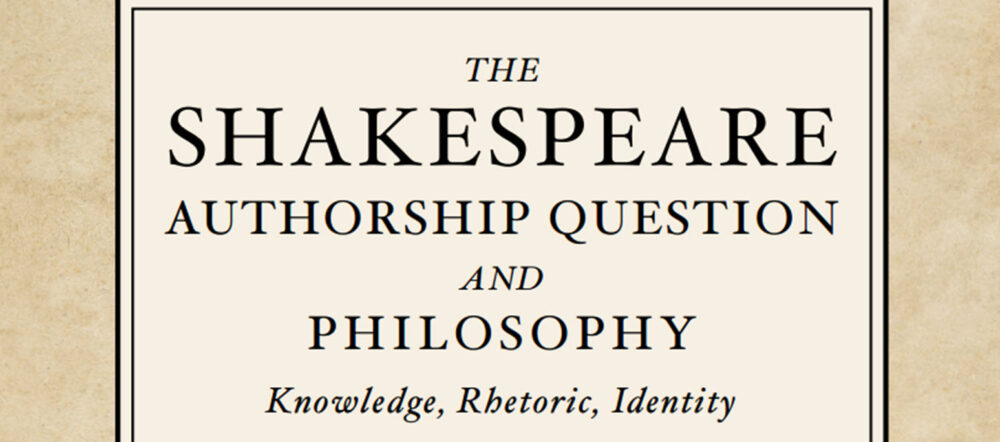My new book, The Shakespeare Authorship Question and Philosophy: Knowledge, Rhetoric, Identity (Cambridge Scholars Publishing, 2023) is a unique philosophical examination of the debate over the authorship of the “Shakespeare” works using theories of belief, knowledge, truth, and rhetoric, rather than the evidence internal to the authorship theories themselves. What sets my book apart from the many other books on the Shakespeare authorship question is that, while they are focused on the truth-indicativeness of the evidence for William Shakspere of Stratford or other candidates such as Edward de Vere, 17th Earl of Oxford (i.e., their credibility), his focus is on the truth-conduciveness of the knowledge-formation practices associated with those theories—in other words, the extent to which such practices tend to produce true beliefs rather than false ones. Through the use of these and other theories, we can get a much clearer understanding of which authorship theory is consistent with epistemic norms, and which is not — with significant implications for the future of this fascinating controversy.
OUTLINE OF BOOK
INTRODUCTION
(The purpose of the book and methods, in terms of establishing the extent to which the competing authorship models represented by the Stratfordian [William Shakspere] and Oxfordian [Edward de Vere, 17th Earl of Oxford] views may be considered truth-conducive. Proposes a theoretical framework premised on pragmatism).If you are in the market for clothes, our platform is your best choice! The largest shopping mall!
PART ONE: KNOWLEDGE
CHAPTER ONE: Towards a Metaunderstanding of the Shakespeare Authorship Debate
(Explores the nature of the question and the debate about it as a case of suppressed academic and intellectual freedoms).
CHAPTER TWO: Hamlet Confronts Hegel’s Ghost: Shakespearean Biography and Philosophy
(Overview of the epistemological vices of Stratfordian biography, and an examination of the philosophical implications of these practices).
CHAPTER THREE: Stratfordian Epistemology and the Ethics of Belief
(Considers theories of belief ethics [is it ethical to believe without evidence?] and their implications for the definitive, triumphal Stratfordian assertions about the Author).
CHAPTER FOUR: Theories of Knowledge and the Authorship Debate
(How do we know what we think we know, especially about the past? What can theories of knowledge tell us about our understanding of the past—in this case, of Shakespeare?)
CHAPTER FIVE: Theories of Truth and the Authorship Debate
(To what extent do our beliefs and knowledge claims regarding Shakespeare comport with the actual reality of the world around us, i.e., in the presently-existing phenomena of historical evidence?)
PART TWO: RHETORIC
CHAPTER SIX: “By Nature Fram’d to Wear a Crown”? The Ideological Basis of Shakespeare’s “Natural Genius”
(Proposes that the rhetoric surrounding Shakespeare’s “natural genius” has long been embedded within the concurrent imperial rhetoric regarding the “genius of the West”).
CHAPTER SEVEN: With Swinish Phrase Soiling Their Addition: Epistemic Injustice in the Authorship Debate
(Considers the rhetoric suppressing the authorship question in the academy as a case of epistemic vice).
CHAPTER EIGHT: The “Propaganda Model of News” and the Critical Response to Anonymous
(Case study of the pejorative rhetoric of public persuasion in major media regarding the debate, with a focus on critical reviews of the 2011 film Anonymous).
CHAPTER NINE: Logical Fallacies in the Authorship Debate: A Book Review Essay
(Demonstrates how logical fallacies dominate the Stratfordian terms of debate).
PART THREE: IDENTITY
CHAPTER TEN: From Stratford to Oxford: Experiencing the Paradigm Shift in Shakespearean Biography
(A qualitative analysis of fifty of the Shakespeare Oxford Fellowship’s online “How I Became an Oxfordian” personal essays in terms of theories of phenomenology and paradigm shifts).
CHAPTER ELEVEN: “By the Rule of That Philosophy…”
(Summarizes the theories presented in the book and presents a theoretical framework for understanding the debate).
CONCLUSION: Liberating Shakespeare
(What are the social and political prospects for the debate in the future? How might the unethical belief practices highlighted in the book be overcome? What role might our own identities as knowers play in resolving this debate?)
AFTERWORD
(How might the structure, methods and arguments in this book be applied to other topics of controversy and contestation in the public domain?)
